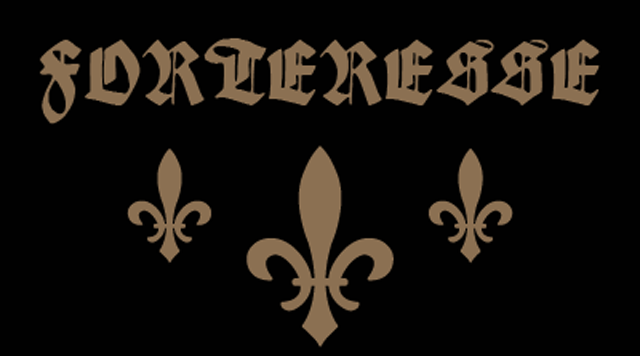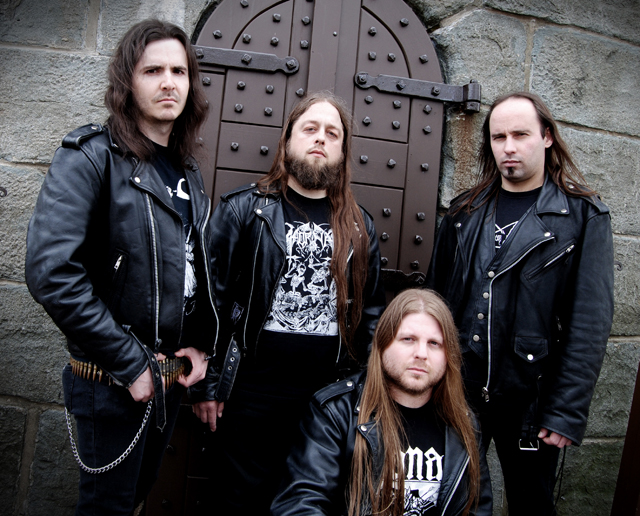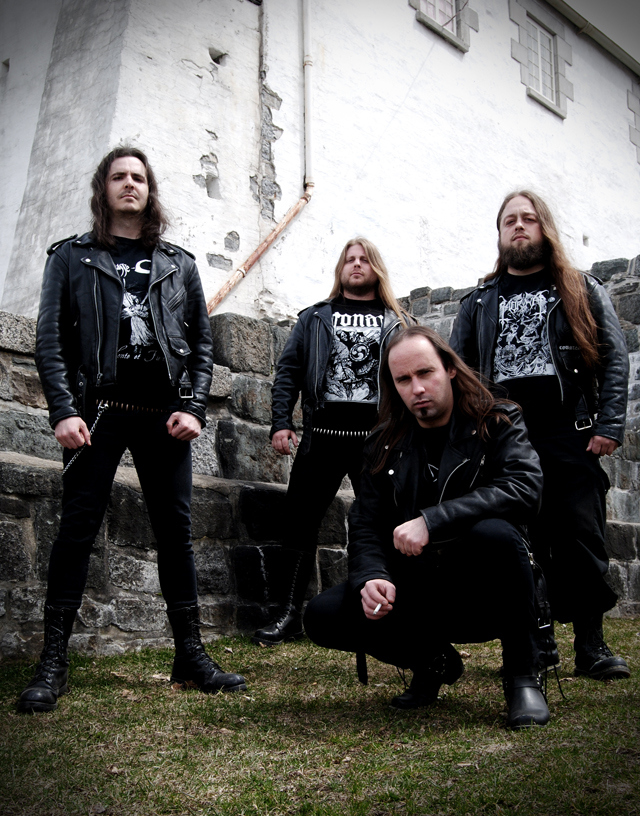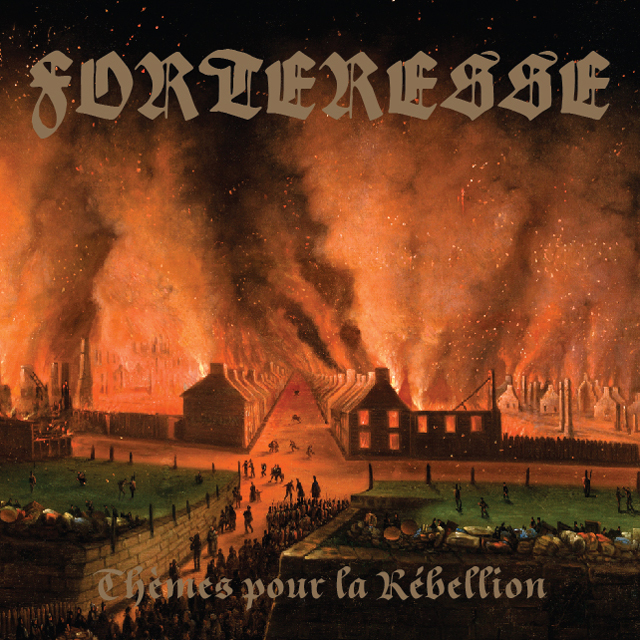
Forteresse. In the wake of their truly exceptional new album, Thèmes Pour La Rébellion (see the review if you haven’t already http://www.avenoctum.com/2016/06/forteresse-themes-pour-la-rebellion-sepulchral-productions ) Ave Noctum were given the opportunity to send an interview the way of guitarist Moribond, a little bit of a wish come true for this writer if truth be told. What we got was every bit as thoughtful, considered and intelligent as their music. Want to know what drives such a focussed and driven band? Read on as Moribund explains.
AN: Hello Forteresse. Firstly thank you for agreeing to this interview (even if I can only conduct it in English, sadly), I consider it a real privilege to be able to ask you a few questions in the wake of your superb, passionate new album Thèmes Pour La Rébellion. You must be so pleased with the result – from the cover to the final note it really is the complete work.
Moribond : We are indeed very happy with this new album. It was one of those albums where everything just felt right and fell into place pretty much on its own. We knew what we were going for and where we wanted to take it and just did it in a way that felt natural to us. In many ways, the experience we have gathered throughout the years recording and creating music really lit the way with this album.
AN: The album seems to be yet another notch up in aggression for Forteresse from your more atmospheric beginnings. Is this a conscious decision, simply a product of the theme this time around or unconscious development over the years?
Moribond: I’d say it’s a bit of everything. Shortly after “Par Hauts Bois et Vastes Plaines”, our most “ambient” recording, we started presenting the material live. Around then we realised that a lot of the more ambient stuff did not feel right live and by that time a lot of other projects were going towards the ambient sound and we did not feel this was a path we wished to travel for the time being. As the years passed I got into more aggressive black metal and traditional heavy metal and I felt it matched the melodic spirit of some of the earlier Forteresse recordings so it’s really a mix of all these things that made it what it is today. To be honest though, we did not think about it all that much. It just sort of happened. It’s still very much Forteresse at heart.

AN: Can you give us a little insight into how your creative process goes? Was the album fully written before entering the studio? How is the writing split, particularly with such a thematic album? Do you demo tracks or play them live before the album recording?
Moribond: I write most of the music and then I show it to the guys who learn the tracks. We rehearse it for some time and by doing this they end up adding their own creativity to it which really is the part where the track comes to life. We rarely play unreleased tracks live because we tend to add to them until the final recording. We recorded everything on our own and Fiel handled most of the editing. We then sent everything to Necromorbus Studio who took care of mixing and mastering.
We used to do all of this alone but we felt like we reached a point where we would like to take it a step further and Necromorbus helped us gain this extra power we just could not do on our own.
The lyrics are written by various members of the project and close friends.
AN: Can you tell us a little about the inspiration for the subject of Thèmes Pour La Rébellion, which I assumed was to do with the unsuccessful Low Rebellion against British rule in 1837 or thereabouts. What is it about this that grabs your heart and soul?
Moribond: Right, the “rébellion des patriotes” is the base of much of Forteresse’s work. However, although we draw inspiration from these events, we do not tell the tale of specific battles like a history book. It’s all abstract and suggestive. I like to let people make their own mind about what this or that is about.
The area known nowadays as Québec was discovered and colonized by the French. Around 1750, the English who were settled around where Ontario is now, decided to conquer “la Nouvelle-France” (New-France) as it was called back then. The French army lost in a battle that took place right here in Québec City called La Bataille des Plaines d’Abraham. A few years later, peace was made between France and England and Québec was created as France traded it for other regions, thus abandoning its inhabitants to be ruled by England. Fast forward to around 1835, many french speaking residents felt the rule of England went against many things they believed in and sought freedom. The “Révolte des Patriotes” ended in flames and death when England hanged some of the leaders of the rebellion and exiled others. Since then, it seems an objective of Canada has been to assimilate French Canadians.
Those events are some of the most important moments in Québécois history and it’s our duty to remind ourselves of where we come from. We must respect what’s at the base of our culture and the fight our ancestors put in order to protect our language and heritage.
AN: You have always possessed a long historical perspective, as well as seemingly a musical appreciation of the wilder landscape of Quebec and previous albums have also had a strong vein of traditional folk music in them further linking it to the founding of Quebec. How do you view the hardships and determination of those first French settlers, and do you have any thoughts on the displacement and treatment of the indigenous people, with the luxury of modern hindsight of course (always a difficult and delicate subject I know – the UK is of course still wrestling with its own history in this respect)?

Moribond: I think some people mistake our position regarding the indigenous cultures of Québec. A lot of it was merged into Québécois folklore and assimilated by the people who moved here. It seems there are those who wish to make us the bad guys in this while the American Indians in Québec were treated for a long time with respect and friendship. The men who learned to live with the natives and helped each other throughout these difficult times are a part of our history and we care about and respect this. It is this union, added to the raw hardships faced by settlers that created what you could consider to be the true Québécois men and women. This is true when you look at the family tree of many, many Québécois family. It is very often that you will find native blood along the way.
Sadly, the indigenous tribes of Québec were treated with lack of respect at later times and the part they played in Québécois history should be remembered and honoured. We payed tribute to their culture with the track Wendigo.
AN: For those like myself who have never had the pleasure of visiting Quebec, can you describe what it is about your homeland and its history that inspires such amazing passion and music in you. What does it mean to be Québécois in 2016?
Moribond: I think everybody has a soft spot for their home, its landscape and nature. We feel our province is simply beautiful and deserves to be treated with respect. From its ice cold winters to nights to warm summer days, its mountains, rivers, trees, we worship it.
Being Québécois in 2016 means seeing your own brothers forget who they are in favour of a language and culture which isn’t theirs. It’s a very sad and infuriating situation.
AN: How did Forteresse actually start? What were your initial goals and immediate influences? Do you consider yourselves ‘founding fathers’ or simply lucky to have been part of an initial wave?
Moribond: I think that back then we sort of knew we were doing something special, as were many bands starting in Québec around that time. We were part of a circle of close friends who would meet at rehearsals and very much live the true black metal lifestyle. All those bands were expressing themselves in french and were separatists so there really was something connecting us and making this feel important.
AN: The QCBM scene seems to have a lot of acts sharing members so do the bands all support each other and act as some sort of consolidated front or are their factions within it?
Moribond : I would say that this is mostly in regards to the Québec City scene which is the place where most bands from the true Métal Noir Québécois circle evolve. We support the projects that share our views and that support us back. We don’t care for projects that don’t take their music seriously and care only about copying Norwegian Black Metal. I’d add that there isn’t a definitive sound to Métal Noir Québécois, but you can tell from who’s playing in it, its language and its themes whether it fits in the circle or not. Some hold the banner of Québécois Black Metal high while others prefer to express themselves in English. I don’t understand why the hell they would choose to do this but whatever…
AN: Tell us how you view Forteresse in particular as part of the wider Métal Noir Québécois scene. From an outsiders point of view it seems to have used a degree of isolation to great effect in retaining a distinct identity. Are there down sides to this?
Moribond: Forteresse is one of the many faces of Métal Noir Québécois. We aren’t above or below the other projects; we just share the same fight.
AN: How would you compare yourselves in Quebec to what is going on in other areas in the world and in the past such as the early Norwegian scene? Musically you and others playing in Quebec have the wonderful hunger and energy that goes back to these early days, and stylistically you also have a head down stance which seems similarly driven. Would you agree? Is it the same with many of the acts within the relatively small and insular scene or is there room for taking more experimental paths?
Moribond: I don’t know why Norwegian Black Metal resonates so strongly within the Québécois scene. Maybe it has something to do with the weather or simply the sense of isolation.
There already are more experimental projects within the scene but people just don’t care to look them up. Mêlée des Aurores is powerful and hateful technical black metal at its best and they still respect the themes of Métal Noir Québécois.

AN: What are you listening to currently both from within your own scene and in the wider world? Anything that might surprise us?
Moribond: I listen to a lot of heavy and doom metal. I can’t say I listen to a lot of black metal these days but I have enjoyed the Malokarpatan album and the Possession EPs. As to what I listen from the Québec scene, the Cantique Lépreux album got many rotations here as well as Sanctuaire’s latest EP.
AN: Currently you seem to be particularly active on the live front which is great to see. Is playing live something you love, as not all black metal bands are of that opinion? Can you incorporate the older songs alongside the newer more aggressive ones? How difficult is it to get gigs and organise your lives around the band in general? Any chance at all of a UK appearance anytime soon?
Moribond: We try to play a bit of everything when we play live and I think it works fine. I can’t say we play a lot of concerts as I try to make all of our shows something exclusive. It had been about 3 years since we last played in Québec. The conditions need to be right, we need to feel like we have something to present as well or else we won’t do it.
As for the UK, it all depends on the offers we get. It’s difficult for people who book bands to get smaller projects across from America because of the expensive plane ticket costs but who knows what the future holds…
AN: Any parting words for the Ave Noctum readers?
Thanks for the interview…
AN: Thank you again for your time. It has been a rare privilege.
There you go. Honesty, insight, respect and thought. Passion, unwavering belief and drive. What more can you ask for from a band? I sincerely want to extend my deep gratitude to Moribond for his thoughtful approach and the sheer time he gave to us with this interview. Truly it is appreciated.
Now you lot, get out there and buy the album. It will just burn…
https://www.facebook.com/Forteresse-312227428819928
http://www.sepulchralproductions.com/collections/preorders
(Interview by Gizmo)

03/12/2016 at 10:13 pm
I just learned about this album yesterday. Its awesome to see a modern day tribute to the Quebec Patriotes who fought to overthrow the British in 1837.
However, I take issue with the assertion that “Around 1750, the English who were settled around where Ontario is now, decided to conquer “la Nouvelle-France” (New-France) as it was called back then.” There were almost no English people settled in the area currently known as Ontario in 1750. There were a handful of English trading posts along the Hudson’s Bay that were staffed by small numbers of people. The Ontario area was mostly controlled by the French, but they also had only a handful of forts and trading posts.
The hostilities between French and English in North America in the 1750’s started between the French soldiers in modern day Pennsylvania and soldiers from Virginia led by none other than George Washington. Large numbers of English speaking people did not move to Ontario until after the American Revolution. The Lower Canada Rebellion in 1837 was joined by a similar rebellion by English speaking people in Upper Canada (Ontario) and although these rebellions were suppressed, they led directly to a more democratic form of Government in Canada, were the Government became accountable to locally elected officials instead of the British Empire.